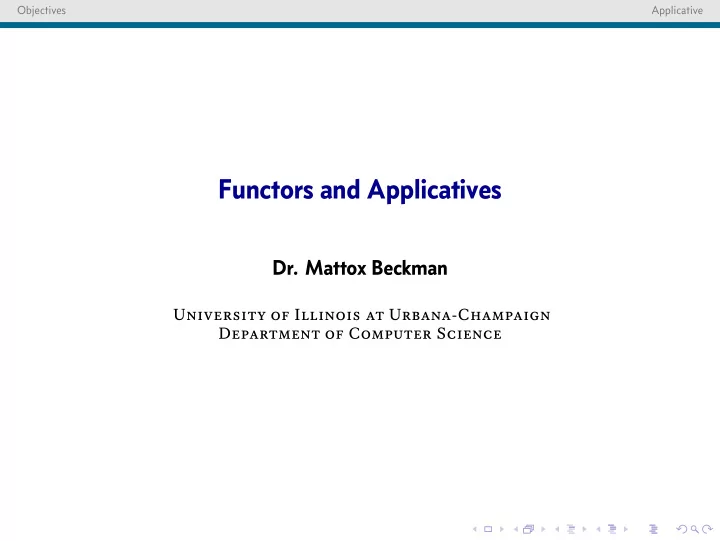

Objectives Applicative Functors and Applicatives Dr. Mattox Beckman University of Illinois at Urbana-Champaign Department of Computer Science
Objectives Applicative Objectives ◮ Understand the motivation and use of the Functor type class. ◮ Understand the motivation and use of the Applicative type class.
Objectives Applicative Motivation Example Types 1 data Tree a = Node a [ Tree a] 2 data Maybe a = Just a | Nothing ◮ Suppose we want to write the map function for these types. What will they look like?
fmap f (x : xs) = f x : fmap f xs fmap :: (a -> b) -> f a -> f b fmap f [] = [] = Nothing fmap _ Nothing fmap f ( Just x) = Just (f x) Objectives Applicative The Functor Typeclass The Functor Typeclass 1 class Functor f where 2 ◮ You can use this to defjne a map for many different types. ◮ The f type you pass in must be a parameterized type. Examples 1 instance Functor Maybe where 2 3 4 instance Functor [] where 5 6
Objectives Applicative Why this is useful ◮ If you defjne a type and declare it to be a Functor , then other people can use fmap on it. ◮ You can also write functions that use fmap that can accept any Functor type. Using Functor 1 Main > let incAnything x = fmap (+1) x 2 Main > incAnything [10,20] 3 [11,21] 4 Main > incAnything ( Just 30) 5 Just 31 6 Main > incAnything ( Foo 30) 7 Foo 31
pure a :: a -> f a Objectives Applicative Applicative Functors ◮ We can take this up one level. ◮ This part of the lecture is “extra”. Sort of.... The Applicative Typeclass 1 class ( Functor f) => Applicative f where 2 3 f (a - > b) <*> f a :: f b ◮ The <*> operator ‘lifts’ function applications.
( Foo f) <*> ( Foo x) = Foo $ f x fmap f ( Foo a) = Foo $ f a pure a = Foo a show ( Foo a) = "Foo " ++ show a Objectives Applicative Declaring our own applicative Complete Foo 1 import Control.Applicative 2 3 data Foo a = Foo a 4 5 instance Show a => Show ( Foo a) where 6 7 8 instance Functor Foo where 9 10 11 instance Applicative Foo where 12 13
-- (Foo f) <*> (Foo a) = (Foo (f a)) Objectives Applicative Sample Run 1 Main > let inc = (+1) 2 Main > fmap inc ( Foo 30) -- fmap works 3 Foo 31 4 Main > inc <$> ( Foo 30) --- synonym for fmap 5 Foo 31 6 Main > Foo inc <*> Foo 20 7 Foo 21 8 Main > let plus a b = a + b 9 Main > : t plus <$> ( Foo 20) 10 plus <$> ( Foo 20) :: Num a => Foo (a -> a) ◮ Do you remember the type of <*> ?
Objectives Applicative Applicatives 1 Main > let plus a b = a + b 2 Main > : t plus <$> ( Foo 20) 3 plus <$> ( Foo 20) :: Num a => Foo (a -> a) 4 Main > plus <$> ( Foo 20) <*> ( Foo 30) 5 Foo 50 ◮ Note that plus did not have to know about Foo . ◮ Note also that Foo did not have to know about Applicative . ◮ If we can defjne pure and <*> and fmap for it, we can use this trick.
<*> w) Objectives Applicative Details ◮ There are some laws that applicatives are supposed to obey. Identity pure id <*> v = v Composition pure (.) <*> u <*> v <*> w = u <*> (v Homomorphism pure f <*> pure x = pure (f x) Interchange u <*> pure y = pure ($ y) <*> u ◮ Haskell does not enforce these.
Objectives Applicative Credit ◮ Many of the examples were stolen off the Haskell Wikibooks page.
Recommend
More recommend